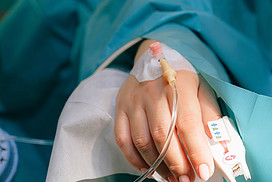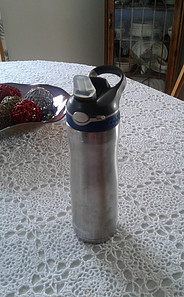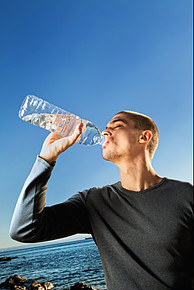Our young type 1 diabetic grandson doesn’t always drink as much water as he should which makes me wonder how does dehydration affects diabetes?
Seriously, we can all be affected by dehydration for various reasons.
We can easily become dehydrated during the summer when the sun is out and the temperatures are high and we seem to be outside being more active than in other seasons but what about now?
I mean it is November, in Canada!
This usually means cold and flu season.
Add to that the fact that we are still in the middle of a global pandemic and the odds of becoming ill and dehydrated is substantially increased.
We all know that with the flu comes:
- nausea
- vomiting
- diarrhea
- runny nose
Pretty easy to see how dehydration can happen pretty quickly with all that going on right?
So what about our diabetic friends and family members? How does dehydration affect them?
The most widely known tell-tale symptoms of diabetes are frequent urination and excessive thirst, clearly, a recipe for severe dehydration don’t you think?
Since high blood sugars are what causes those symptoms to begin with and we know diabetics are battling those blood sugars daily I think we need to learn what effect dehydration has on our diabetic friends and family and how we can help them.
Table of Contents
Water impacts our body’s more than we realize

Were you aware that different tissues within our body are made of different compositions?
For example, our body is made up of 60% water, our muscles are made up of 75% water and our brain consists of 85% water.
Water acts very much like oil to an engine.
Many functions in our body require an adequate supply of water which:
- carries oxygen and nutrients to cells throughout the body
- flushes bacteria
- aids in digestion
- prevents constipation
- helps normalize blood pressure
- maintains a stable heartbeat
- cushions joints
- protects tissues and organs
- regulates body temperature
- maintains the body’s electrolyte and sodium levels
- several studies suggest water aids in weight loss
As you can see we definitely depend on the water so be sure to grab a glass and drink up.
How does water affect diabetes?
The fact is dehydration and diabetes often go hand in hand.
Seriously though, diabetes occurs when the body either doesn’t produce enough insulin or can’t use that insulin effectively.
This creates extra sugar in the blood which causes the kidneys to work overtime trying to filter and absorb all that excess sugar.
According to the Mayo Clinic, your body expels sugar in the urine, which also drags fluids from your tissues.
This causes you to urinate more frequently which risks further dehydration.
It stands to reason that diabetics can significantly reduce their risk of dehydration by following their diabetes care plan as set forth by their diabetes team and managing those blood glucose levels to within or at least close to the target range.
Symptoms of dehydration
There are several symptoms of dehydration which includes:
- thirst
- headache
- dry mouth and dry eyes
- dizziness
- tiredness
- dark yellow coloured urine
Sometimes dehydration can become severe and those symptoms include:
- low blood pressure
- sunken eyes
- weak pulse/rapid heartbeat
- confusion
- lethargy
Treatment of dehydration
Dehydration is treated by consuming fluids. Water is best because it is sugar-free.
In cases of severe dehydration and medical treatment is required, electrolytes (salts) may be given with fluid intravenously to replace those lost through dehydration.
If dehydration is caused by hyperglycemia (high blood sugars), taking sugary drinks could compound the problem.
In some cases, depending on your specific treatment plan it may be possible to actively lower your blood glucose levels by taking additional insulin.
Naturally, this depends on whether your diabetes care team is comfortable with you doing this.
Dehydration can have serious consequences for diabetes because it drastically increases the chances of developing DKA, kidney failure, or a hyperosmolar hyperglycemic nonketotic state.
As you can see it is imperative for diabetics to not only drink enough water daily but to also follow their treatment plan to manage those blood sugar levels.
How much water should we drink to prevent dehydration?
There really is no concrete answer as to how much water we should drink each day.
Many factors determine our needs each day.
A good guideline would be to always have water available whenever you feel thirsty.
There is no need to force yourself to drink a set amount of water.
Personally, I keep my water bottle with me at all times and sip water throughout the day which helps avoid getting that parched feeling when dehydration begins to set in.
It seems our thirst reflex isn’t always perfect, especially for diabetics, so drinking a little regularly can really help prevent dehydration.
Typically, the average non-diabetic person would drink 8 glasses per day so a diabetic should drink at least that, more if you are thirsty.
When you think about it 8-glasses are equivalent to about 2 Litres (approx. half a gallon) which really does sound like a lot. I use my 20-ounce water bottle and fill it 3 times throughout the day.
A few things that may make us require more water would be:
- summer heat
- working out (we lose a lot of water through sweat)
- illness (we lose a lot of water through fever, vomiting, and diarrhea)
It is important to increase our fluid intake whenever we are ill, out in summer heat, or exercising.
Is there ever a reason to limit water intake?
Harvard research explains it is possible to take in too much water. This surprised me because I always thought if we drank too much water we would just urinate more to get rid of the excess.
Apparently, too much water in our system can be overtaxing for some of our systems if we have certain conditions or take certain medications. These would include:
- kidney disease
- thyroid disease
- liver disease
- take medications that cause water retention
- non-steroidal anti-inflammatory drugs (NSAIDs)
If any of these applies to you, your doctor will advise you on how much water is appropriate for you to drink daily. Always follow your doctor’s recommendations.
Conclusion
So how does dehydration affect diabetes is a serious question with serious answers.
While dehydration can affect any of us at any time the consequences can be so much more severe for a diabetic.
The very nature of what diabetes is put diabetics at risk daily for developing dehydration.
Make sure you look out for symptoms of dehydration which can include:
- thirst
- headache
- dry mouth/dry eyes
- dizziness
- tiredness
- dark yellow coloured urine
Seek immediate medical assistance if symptoms of severe dehydration occur:
- low blood pressure
- sunken eyes
- weak pulse/rapid heartbeat
- confusion
- lethargy
You can potentially avoid dehydration simply by sipping water regularly throughout the day and by following your diabetes care plan to manage blood sugar levels.
I am not in any way a medical practitioner, please do not rely on the information on our website as an alternative to medical advice from your doctor or another healthcare provider. We only share our experiences.
How much water do you drink in a day?
Do you keep a water bottle with you at all times?
Do you have any tips to share about how you avoid dehydration or manage your blood sugars each day?
Leave your suggestions in the comment section below.


Hi Deb. It’s interesting that your recommendation is to sip water all day. I believed that myself as well for a long time. But for recent years I have been subscribed to newsletters of Dutch experts on health. One is an orthomolecular doctor, the other a pharmacist.
Their opinions differ very much from the usual heard ones. And one is that you shouldn’t sip water all day, but drink only a couple of times a day. A lot each time. Their recommendation still is an amount of 8 glasses a day, so it’s not the amount but the timing that is different.
I like hearing opposing opinions about subjects. It forces me to realize what I actually believe myself and why. 🙂
Hi Hannie. The opinion of those Dutch experts is interesting. I know with Alex he would not be able to drink large amounts at one time. He is definitely a sipper and with food, he tends to be a grazer which makes managing his diabetes tricky. This is because his mealtime insulin dose depends on the number of carbs eaten. If he only lightly snacks at mealtime he is not getting enough insulin and it can create the need for bolus shots later. He is already at a minimum of 4 shots per day so we are really encouraging him to eat full meals and allow him to sip water. If his blood sugars are quite high, that is when we push the water. He hates that but we got to do what is necessary. It is a “pick your battles” kind of situation. Thanks for pointing out a differing opinion. I love constantly learning new things.
I can imagine it’s hard to handle with a kid that small. And you’re quite right to pick your battles in that regard. One of the grandkids of a Dutch friend has an autoimmune disease – I forgot what it is exactly – she is not allowed to have certain ingredients. It’s unbelievable how tempting the stuff is they offer to children. Either by the ads, where the (grand)parents can at least try to shield them from. Or not-knowing-anything organizers of a sports game that as prices have the most horrible bag of sweets you can imagine. A sports game, mind you, the combination with sweets is silly enough as it is. But having to force the kid to give it back because she really can’t and shouldn’t eat it was awful, as you can imagine.
Thanks for commenting, Hannie.
It can be difficult to ensure Alex is drinking enough water as he doesn’t always want to.
There are also times when his sugars are low and we are forcing him to eat some fast-acting sugar snack to raise his blood sugar levels. It seems so strange to force sugar on a kid but there are times it is necessary.
One of our sons has Celiac disease which is an auto-immune disease and is quite restrictive as he can’t have any food containing gluten so all wheat products are out for him. It sounds like your friend’s grandchild has the same thing. I make gluten-free baked goods for Jon so he can still have some Christmas treats that are safe for him.
You are correct it is horrible to have to take away treats from a child. We are fortunate that Alex asks what he can eat before doing so and understands that he may have to wait a while before having something. I am sure as he gets older that may change.
Thanks again for dropping by. Take care.
Hi Rick I really like the article and i think its an important topic. I think diabetics should drink plenty of water during the day. I think anyone should for all the reasons you mention. It serves as a great reminder for me because i do think I drink too little. I would say 2 liters in a day would be good. I don’t think there are any rules as to when to drink it. I usually listen to my body and drink when I am thirsty.
Thanks for dropping by Jesper and taking the time to leave a comment, we really appreciate it.
I agree everyone should drink plenty of water daily and I too believe in listening to our body about what we need and when.
A previous comment mentioned that dutch researchers were thinking we should drink more at mealtimes rather than spread out throughout the day.
I tend to believe it is better to drink small amounts throughout the day. It works for me and for our grandson.
Listening to your body is always best in my opinion as we are all unique in how our bodies react to things.
I believe 2 litres a day is a good amount but maybe more with heavy exercise or hot weather.
Thanks again and take care.